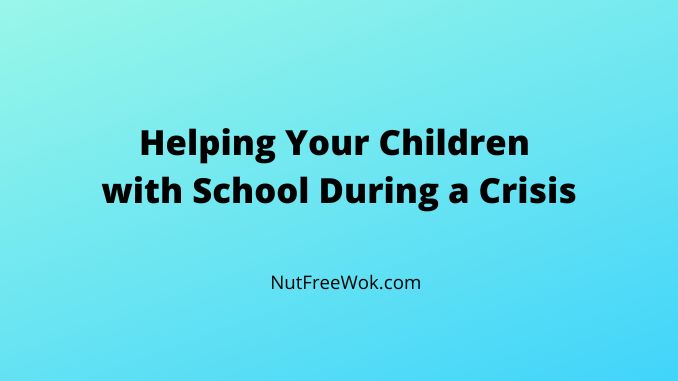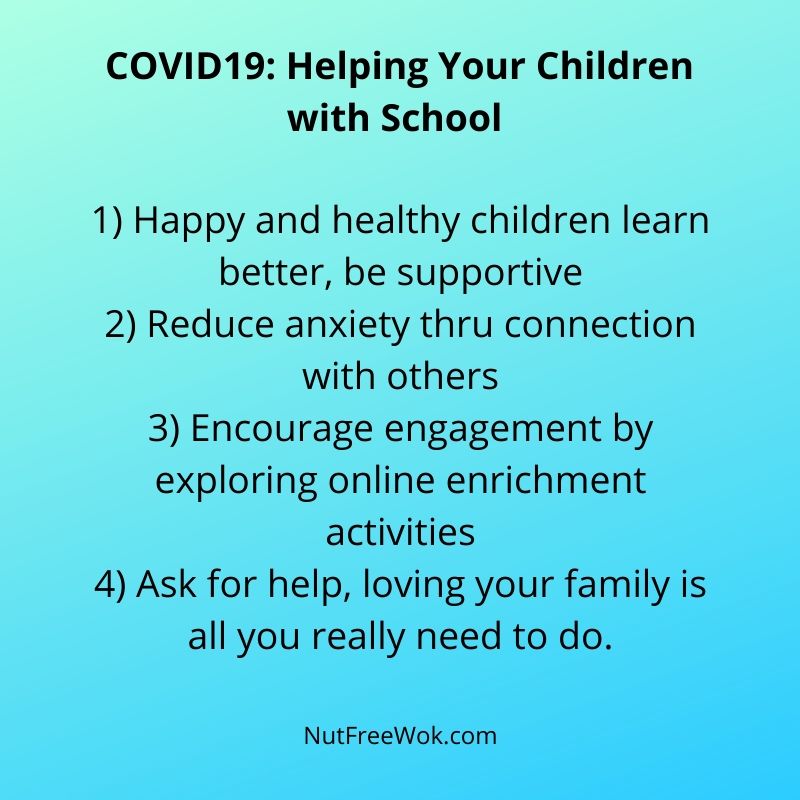
Are your children home 24/7 due to school closures or a local crisis? And are you wondering how to help your children with school during a pandemic? How are they emotionally? I want to share some big picture thoughts first and then some enrichment types of educational resources in the second half of this article, be sure to read all the way to the end.
Update: this post was originally related to school closures during 2020 and I’ve updated it to be a resource during a crisis that may disrupt your child’s access to school. Many of these resources are dependent on having internet access when in reality, some people may be struggling with access to shelter, food, and water. Please refer to these resources compiled by FAACT.
Disclaimer: This post is for information only, please consult your medical care team or your child’s teacher if you have any specific questions. This post may contain affiliate links. I also talked about some of these concepts in a Facebook Live with some food allergy advocate friends, but here are more links and more elaboration of my ideas.
Education is So Important to Me
The kids miss their friends, teachers, and routines at school. Online schooling for K-12 is something new for the 21st century. But because of the emergency nature of natural disasters and other events out of our control, let’s acknowledge that there’s an undercurrent of anxiety coupled with many of us flying by the seat of our pants to try and do our best to stay safe but at the same time carry on with work, school, and /or daily activities.
Many of you know me as a food allergy mom, advocate, and recipe blogger who has this radical idea that people with food allergies can enjoy “allergy aware Asian fare” safely like Char Siu Bao or Yakisoba Noodles. But I was surprised to realize that few people know that I am a former classroom teacher with a bachelor’s degree in molecular biology and a masters in education before becoming a mom.
I’m as passionate about education as much as I am about food allergies. During my senior year at Cal, I interned as an educational policy analyst for the University California Office of the President. I went on to earn my multiple subject teaching credential and Masters of Education at UCLA because I wanted to seque into educational policy and/or curriculum development. I taught elementary school in public and private schools and worked with students from the inner city of east Los Angeles to cushy suburban neighborhoods for many years. I ended up being an educational technology specialist and teacher trainer before having children and loved my job but I gave up going back to work because my children needed me. I also tutored on the side for many years to help make ends meet but I’m familiar with how it is to help children 1:1.
As a young mom, I used to check out between 50-100 books each week to read with my children and am sharing many ideas inspired by activities I did with my own children. Based on my experiences, I would like to offer some suggestions and advice on how do we help our children with school thru these unusual and unprecedented times together.

Consider the Whole Child First
If you’re feeling anxious or stressed, it’s very likely that your children (or child) feel the same way. But children might not express their feelings in ways we expect and might need your support and gentle guidance.
Converse with your child and be open to listen more than you talk. You will learn more about your child when you ask open ended questions about important things in their world. Instead of asking did you like online school today, ask “what was something interesting that you learned today?” What assignments are you working on? Can I help you with anything? Find out which friends do they miss and suggest setting up an online playdate (via Facetime, Zoom, Skype, etc.) for a sense of normalcy.
Take a step back and observe if you have any concerns regarding your child’s overall health, sleep, exercise, meals, and whether there are any health related concerns. Reach out to your pediatrician if you have any questions. As I had mentioned in my post for people with food allergies and asthma, be extra vigilant to avoid anaphylaxis or asthma flares and follow best practices and carry all prescribed emergency medications.
The CDC has a section about identifying changes in children’s behavior and how to help them cope with the stress of disruptions due to natural disasters and other crisis. Definitely reach out to your medical care team with any concerns or to ask for a referral for specialized help.
Not all children and teens respond to stress in the same way. Some common changes to watch for include:
- Excessive crying or irritation in younger children
- Returning to behaviors they have outgrown (for example, toileting accidents or bedwetting)
- Excessive worry or sadness
- Unhealthy eating or sleeping habits
- Irritability and “acting out” behaviors in teens
- Poor school performance or avoiding school
- Difficulty with attention and concentration
- Avoidance of activities enjoyed in the past
- Unexplained headaches or body pain
- Use of alcohol, tobacco, or other drugs
Happy and Healthy Children Learn Better
We have to think about their emotional health first. A happy and healthy child can learn but not if they feel stressed or sick. We can feel a wide range of emotions when the whole world is faced with a life threatening and very contagious disease. We are all in survival mode and life is not the same. Some families will experience loss of loved ones. We must be kind and support each other and our children with compassion and empathy.
If online schooling isn’t going well, be sure to reach out to your child’s teacher for support and guidance. They know your child best and I am positive that they are collaborating regarding best practices. Be sure to show your children’s teachers grace and kindness when glitches happen as all of this is new to them too, they are dealing with the same issues we are.
Other ideas include reaching out to your community for support. There are university students and high school students who might be willing to tutor younger children. Maybe you have some lonely grandparents, aunts, or uncles who can’t get out but would be willing to chat by phone, to help with homework, or read a story together.
Ideas on How to Reduce Related Anxiety
Help your children to connect with others. Maybe they need to call their grandparents or elderly relatives which will help both generations. Maybe they need some online playdates with their friends. Maybe they need to find expression through music, art, building things, dance, etc..
Take a step back and spend time together reading, baking (hey, stress baking is a thing!), play board games, garden, take nature walks, and incorporate learning opportunities and enrichment along the way. We are our children’s parents, not their school teachers, and it takes time to find our new normal.
The CDC has some general tips on how to cope after a natural disaster as well as other resources on their website, including a hotline to talk with someone. FEMA has child specific tips on how to help children to cope with a disaster.
How to Fight Boredom and Increase Engagement Thru Enrichment Opportunities
Informally evaluate how well online school is going via open ended conversations with your child. Find out how are they doing with their online educational activities that are required and assigned by their teachers. Too much, too little? Are they engaged? Are they curious? Younger children might need more of your attention and guidance, older students might need help with organizational skills and accountability.
Online learning from home during such a tumultuous time will be dramatically different from being at school with teachers, friends, and a daily schedule. Almost all the students are in the same situation and will have opportunities to fill in any knowledge gaps when the regular school year starts up again.
I would be thrilled if our children finish the school year and happy and healthy. I would also propose that you have a unique opportunity to help them to discover their interests and to use those opportunities to build upon their academic skills. Say what? Yes, sneak in the academic opportunties like you would add pureed veggies to every meal.
Suggestions for Younger Students
The main objective of learning at home during this time is to identify their interests and to pique their curiosity. How do we pique their curiosity? Help them to observe the world around them and ask questions to learn what they don’t know. If they are learning specific content thru their school curriculum, help them tie the content with their real world and discover how is it applied in the real world.
- What kinds of questions do they ask? What interests them?
- What kinds of books do they like to read?
- Many public libraries have collections of e-books that you can check out to read on a tablet, phone, or computer.
- Khan Academy has an age appropriate schedule and activities for students
- Take them on virtual field trips. Museums all over the world have online resources.
- Who are their favorite authors? Many authors are reading their books aloud and sharing their videos on their websites or social media accounts.
Pick any topic that you’re child might be interested in and you can easily hit every academic discipline while exploring the topic in depth. I just looked up third grade science and one of the subjects is life science, which includes plants and animals. You and your child can read some books about plants or animals, take a nature walk for exercise, write in a journal about observations or write stories, draw pictures (art), do a bug count (math and easy data analytics).
Suggestions for Older Students
This is an amazing opportunity for older students to learn and grow into resilient young adults. Encourage them to make the most of this time to be a leader, to solve problems, and to help their community and then there’s a personal connection to reading, writing, speaking, computing, and expressing themselves.
I highly recommend that older students keep a journal. They will appreciate having their first hand accounts to look back on when it’s time to work on college application essays. They don’t have to write about the coronavirus pandemic specifically but since the stay at home days might start to blur together, writing down some observations and thoughts might help them later.
Now is also a good time to teach them life skills. They can contribute to the day to day activities and also learn some valuable skills for when they go away for college or move out to work. Teach them how to cook their favorite dishes, how to do laundry, how to clean and disinfect surfaces, how to bank online, how to sew a button, mend and alter clothes as examples.
Enrichment Ideas and Resources by Subject
Reading
Read, read, read. Snuggle and read aloud together. Incorporate 30 minutes of silent reading everyday. Read about everything. This is the easiest and the most important thing to do. Read.
- American College of Education: An exhaustive list of free reading resources for teachers
- Storyline Online – celebrities read their favorite books
- Internet Archive – Children’s books, many other books in other subjects and genres are available
- Reading Rainbow – Amazon Prime subscribers can watch the entire series
- Check out e-books and audiobooks from your local public library
- Read a book and watch a movie version of the book and have a discussion about the similarities and differences.
Math
- Khan Academy – as mentioned earlier, Khan Academy is an amazing resource in all subjects but math is their core curriculum and they have a section dedicated specifically for our current coronavirus needs.
- YouCubed by Dr. Jo Boaler, Stanford professor. Most people don’t know this but my son was in another clincial trial at Stanford and appears in this YouCubed Summer Camp 2015 video. It was such a fun summer.
Science
I love science, which is basically about how we observe the world around us. For example, biology is the study of all living things including humans, plants and animals. Chemistry is about what are things made of and how do they change. Physics is about building things and how do they move.
If you don’t know, you can look up some of the local zoos, aquariums, and science museums in your area for inspiration. Usually their websites will have interesting things to look at such as web cams, previews for exhibits, etc. Here are some examples that I know of
- Lawrence Hall of Science in Berkeley. Check out their “do science everywhere” apps
- California Academy Hall of Science in San Francisco has an “academy @ home” section for a virtual tour. It also has a nature app, students can take a picture of an interesting plant or animal, upload it and the community will help identify the plant or animal and students can learn more about them.
- Exploratorium – hands on science museum in San Francisco has online resources
- NASA – has so many NASA at home activities
- National Museum of Natural History
- Nature on PBS
- Bill Nye Science Guy – lots of resources until the “Learn” tab at the top
- Visit zoos virtually. My favorite is the Panda Cam at the National Zoo. But did you know that there are also panda cams at zoos in San Diego, Atlanta, Memphis, and China?
Social Studies/History
- We are living in a time that will be included in social studies textbooks and history lessons for generations to come. Time for Kids is a great way to find age appropriate and well curated information.
- If your children teachers are including social studies/history types of assignments, you can explore in greater depth. What would be a relevant field trip and can you take an online field trip? The Smithsonian is a great place to start but there are probably similar history museums at your state and county level as well.
- If you aren’t sure and/or have extra time, you can look up your state’s curriculum to find out what topics are covered in your state by grade level. For example, here is a link to California’s social studies framework and you can find the appropriate framework (curriculum guide) for your state. If you are curious there are other frameworks for every subject.
Art & Music
- Mental Floss – 12 World Class Museums You Can Visit Online
- Some artists and authors are hosting free art lessons online, having at home concerts
- Lunch doodles with Mo Willems – https://www.youtube.com/watch?v=RmzjCPQv3y8
- Kyle Dine – food allergy musician in concert with his darling little daughter – https://www.facebook.com/KyleDineMusic/
Learn Science at Home From Day-To-Day Activities
Most of us can read and write and do math reasonably well. My wheelhouse is in science and I just want to give you some extra encouragement that you can help your students study science at home too. My favorite way to teach science is thru gardening, which I will write about next. You can learn science from ordinary day to day activities and asking related questions. Here are some famous examples:
- A Swiss engineer, Georges de Mestral, went hiking and noticed he had little burrs stuck to his clothes and when he looked closer, they had little hooks on them and that’s what led to his invention to now what is know as Velcro.
- Sir Alexander Fleming was growing bacteria in petri dishes and some of the dishes became moldy. However he noticed that there were certain molds in which the bacteria did not grow and that led to his discovery of penicillin.
How to Learn From Observations
As an example on how to dive deep into simple topics, it was the first day of spring not too long ago. What does that mean and what can we learn from it?
- Learn about the spring equinox and how does the earth rotate around the sun?
- How do people from different cultures celebrate spring?
- What plants are blooming with flowers or budding with leaves?
- Draw the anatomy of plants or flowers or take pictures of them every day or once per hour
Observe and think about why is something is important and if you have questions, then maybe that will lead to some science experiments with the scientific method as a guide.
- Purpose, why is this important, do some research
- Come up with a hypothesis or guesses
- Experiment with controls and one variable and collect data
- Analyze data
- Make a conclusion
- Share it with others
A Special Note for Working Parents
Whether you are working from home or have an essential job, this new responsibility will be challenging on top of everything else that is going on. Please be kind to yourselves and be sure that you are meeting your own basic needs of sleep, food, exercise, and connection with others.
Ask for help, take turns with a trusted relative, spouse, partner. Hire a high school or college student to help with tutoring and mentoring. If you can only do one thing to help your child academically, let it be to encourage reading. Read, read, read. On those days when all you can do is give them a hug and love them, then that’s good enough. Be happy and healthy, have fun with our children, and grow closer during the next few months.
Do you have your favorite educational resources? Please share them in the comments.
Thanks for reading, please help Nut Free Wok!
If you like this post or recipe, please be sure to give a 5 star rating, leave a comment, and share this post! Your support means a lot to me.
Subscribe to Nut Free Wok’s email subscription (be sure to respond to the confirmation email). You will be notified by email next time I publish another post or recipe and I won’t send you spam or share your email address with anyone.
Disclosure/Disclaimer:
I may mention the names of stores and/or brand names of products that I use because readers ask and I share products and sources which I use and think may be helpful to readers, all opinions are my own. Please note that manufacturing practices and ingredients can change at anytime without notice and readers are always responsible for assuring allergen safety before buying or consuming foods. NutFreeWok.com is a participant in the Amazon Services LLC Associates Program, an affiliate advertising program designed to provide a means for sites to earn advertising fees by advertising and linking to Amazon.com. Thank you for reading!






